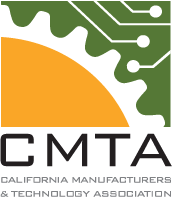CMTA’s Mission
The California Manufacturers & Technology Association (formerly the California Manufacturers Association) works to improve and enhance a strong business climate for California’s 30,000 manufacturing, processing and technology based companies. Since 1918, CMTA has worked with state government to develop balanced laws, effective regulations and sound public policies to stimulate economic growth and create new jobs while safeguarding the state’s environmental resources. CMTA represents 400 businesses from the entire manufacturing community — an economic sector that generates more than $230 billion every year and employs more than 1.2 million Californians.
CMTA Public Policy Objectives
Competitive tax policy for manufacturers
California is one of only four states that imposes a sales tax on the purchase of new machinery and equipment. To tax both the “input” and the final manufactured product amounts to “double taxation” and is poor tax policy. Many states provide both a sales tax exemption and investment tax credits to encourage manufacturing investment. California should provide competitive tax policy for manufacturers by exempting the state sales tax from the purchase of machinery. This would also provide manufacturers some relief from the high cost of doing business in the state, nearly 24% greater than the national average. It is vitally important that California tax policies encourage high-wage manufacturers to expand facilities and employment in the state.
Increase career technical education
California’s existing career-tech facilities in the schools have been ignored for the last 40 years. Students who could succeed in technical fields are not being adequately served by our schools. High school drop-out rates are too high and climbing. One in four high school students goes on to obtain a four-year college degree. At the same time, California businesses are now experiencing and foresee future critical shortages in technically-skilled workers. As the shortage of technically capable workers grows, businesses will find it difficult to remain competitive in California. The existing gap in meeting the educational needs of both our children and the 21st century economy can be remedied with a commitment to provide for a relevant and robust career technical education system.
Workforce for the California economy
California manufacturers are now experiencing and foresee future critical shortages in both technically-skilled workers and college educated engineers. As this shortage grows, manufacturers will find it difficult to remain competitive in California. The existing gap in meeting the educational needs of both our children and the 21st century economy can be remedied with a commitment to provide for improved math and science education, as well as a relevant and robust career technical education system.
Achieve greenhouse gas emission reductions and protect the economy
In 2006 the legislature passed AB 32, The Global Warming Solutions Act. To achieve the emission reduction goals of the bill regulators should adopt policies that are cost-effective and technologically feasible. In this way we can ensure that manufacturers remain competitive in California and that industrial growth does not move to other lower cost regions with no emission reduction requirements. Environmental quality and economic development must be the mutual goals for successful climate change policies.
Support science-based environmental regulations
California manufacturers must comply with the most stringent environmental regulations in the nation. Nevertheless, we support new proposals based on sound scientific findings that would result in meaningful improvement to the public health and environment. However, to minimize costs and ease regulatory burdens, regulations should be coordinated with other state and federal programs, their enforcement should emphasize increasing compliance first and penalties that are imposed should be proportionate to the environmental harm and the culpability of the violator. By ensuring that manufacturers can continue to make products in the state with reasonable regulations we will improve both the economy and the environment.
Access to affordable healthcare
The costs of health insurance has grown exponentially in recent years. Many Californians are unable to afford insurance, and companies are finding it difficult to maintain healthcare benefits for their employees. Policies that will lower the cost of healthcare, encourage more individual responsibility, and provide appropriate subsidies for low income families will increase insurance coverage rates in the state. A mandate to shift the cost of healthcare onto businesses will not solve the underlying problem of high healthcare costs and would harm the California economy.


